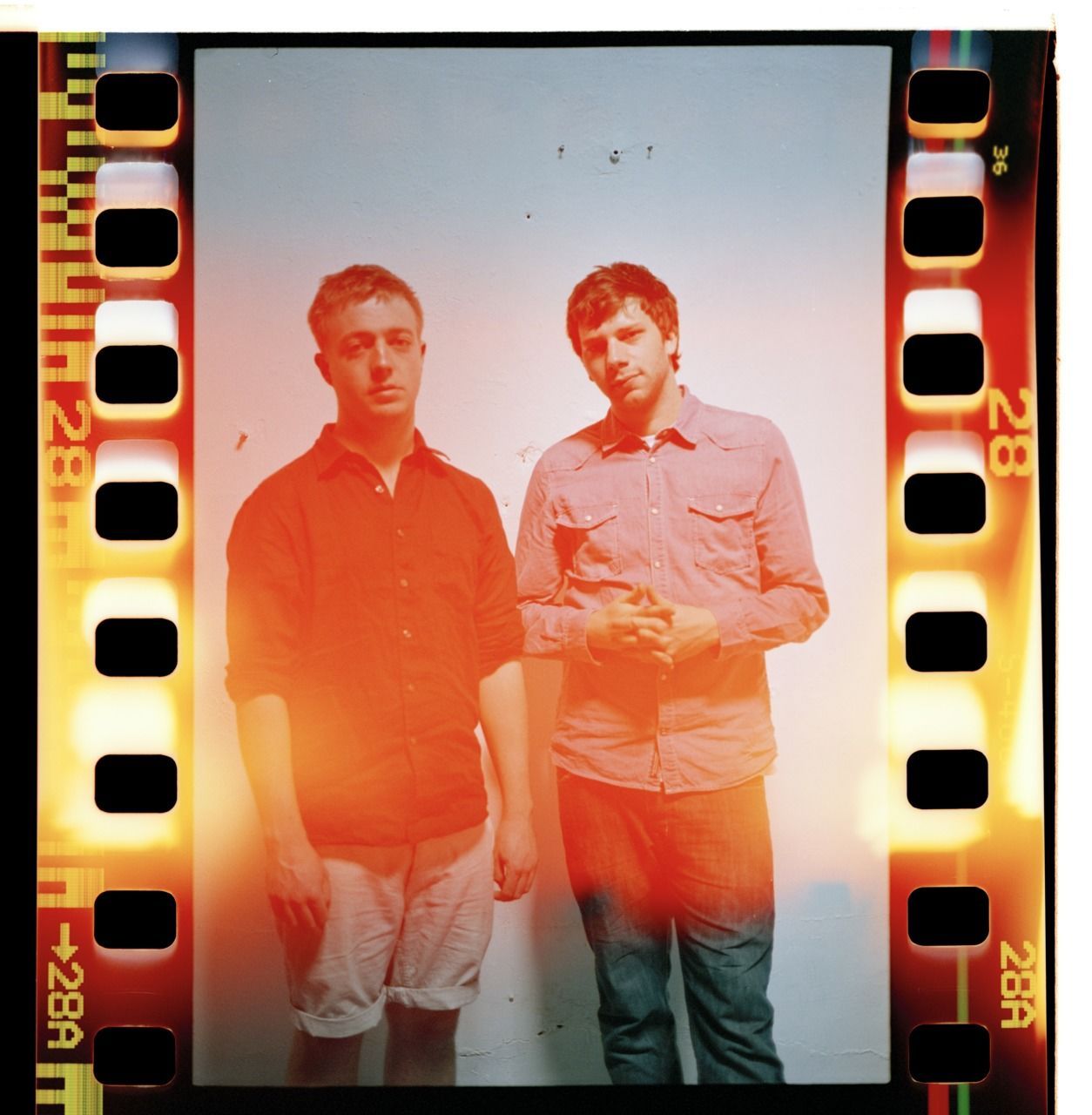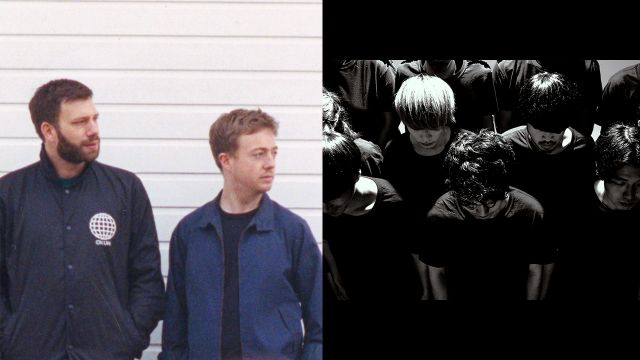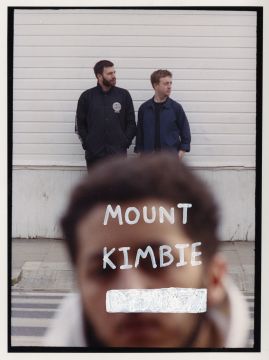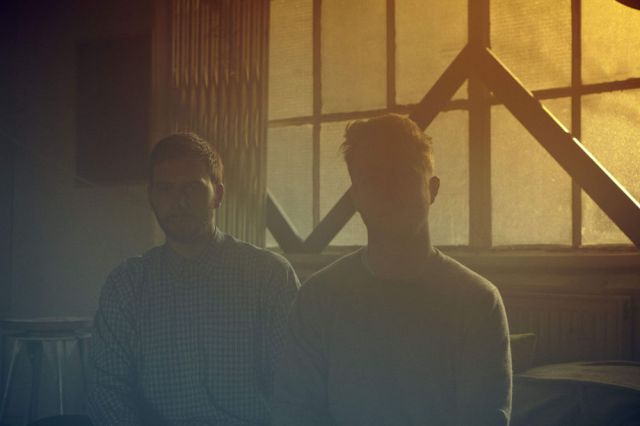マウント・キンビーとは、一体何者なんだろう?
「いきなり難しい質問だね」とドム・メーカーが考えにふけるようにつぶやく。「答えるのは難しいな」と相方のカイ・カンポスが相槌を打つ。「あまり言葉に出さない事なんだ」
2009年にこの二人組がリリースした2作のEP「Maybes」と「Sketch on Glass」を聴くと、人間の心に秘めた空間を探索しているような気持ちになる。群集に囲まれていながらも心を閉ざし引きこもっている一人の他人の頭の中に勝手に入り込んでしまった気持ちだ。
その理由と背景は、マウント・キンビー発祥のストーリーを知れば理解できるかもしれない。全てはカイ曰く「とにかくクソで最悪な町」、ロンドン南部エレファント・アンド・キャッスルで、大学生の二人が出会った所から始まった。
「大学が学生寮として改造したのが古い精神病院だったんだ。冷たくて活気がなくて気が滅入らずにはいられないコンクリートの建物で、ペンを落とせば音がこだまするような空間だった。」
確かにマウント・キンビーの作品にはエコーは重要な役割を持っている。
ダブステップ・グライムのアーティストとして一世を風靡しているジェイムス・ブレイクとも、この時期からの親友だそうだ。「ある晩、ジェイムスを交えてドムの家でリハした後、酔っ払って大声で歌いながら家に帰る途中で50メートルほど長いトンネルに入ったんだ。ものすごいリバーブが響くトンネルで、数ヵ月後マイク持参で音を録音しに戻った。クソ寒い夜中に田舎町のはずれのトンネルの中でヘンな男達が三人ハーモニーを歌っているのさ。あの夜録った音は今回のアルバムにたくさん使われている」
この夜拾ったサウンドの断片と新たな野心を携えて、二人はカオスとも呼べる街の生の音をリズムでまとめ、感じたままのロンドンを音楽に変えていくようになった。常にどこかでサイレンが響き渡るロンドンの喧騒や、うんざりするようなトランス・シーンの音楽や人間層から離れようとした試みだったのはよく理解できる。長旅の汽車の中、くもの巣が密集する薄暗いガレージ、元精神病院の部屋...不思議で親密な空間で作られ、そんな場所で体験するために制作された音楽なのだ。しかし、「そんな場所」は一体どこに存在するんだろう?
ポスト・ダブステップと称される音楽が多方面に分散する今、そのアティチュードとアプローチから見ても、元々はベースに惹かれてUKクラブシーンに近づいた経歴を取っても、マウント・キンビーは新しいジャンルの発起人の一組と呼べるだろう。
ダブステップのエレクトロ版とも呼べる彼らのサウンドはジャンルを選ばないから、ルールやお約束にも縛られない。ダブステップからヒップホップ、ジャズ、テクノ、アンビエンス、ポストロック、UKガレージや映画サントラまで、音楽の境界線をすり抜けていく。が、マウント・キンビーの音楽を物理的な指標で表そうとすると、また冒頭の質問を繰り返し問いてしまう。
「マウント・キンビーとは、誰なんだ?何なんだ?」
それは、カイとドムの嗜好や感情が合わさって共鳴する領域なのだろう。二人が出会った当時、イギリス最西端地方コーンウォールの田舎町から上京したてだったカイにとっては特に辛い一年だったという。あの時期、あの場所という条件の下で二人が会っていなかったら?
「あそこで会ったからこそ今の俺達があるんだ」と即答するドム。カイも「出会った頃感じていた物は今でもあの頃、ロンドンで暮らし始めた最初の1,2年間抱えていた感情を今でも音楽の素材にしているよ。」と合意する。
確かに、マウント・キンビーの音楽から滲み出る感情の渦に浸っていると、二人のそんな出会いから生まれた感情が聞こえてくるかのようだ。何より大きいのが安堵、そして歓喜、好奇心、みなぎる自信。そして、それまで何かを探していた頃の記憶と寂しさが蘇ってくる。
「Maybes」と「Sketch on Glass」から聴こえる苛立ちや逃避、不可解であまのじゃくなサウンドはそんな過去と現在の記憶や感情が混合した場所から発信されているのだろう。
絶えず変化する都市の生きた部分が切り取られ、人工照明や汚い空気と一緒に人の中に閉じ込められた記憶が、静かに重く二人のサウンドの中で甦る。
「僕にとって意味がある音楽は、感情の渦や相反するものを持ち合わせているからこそ音楽と呼べるものなんだ」とカイは説明する。「だから音楽なしにはいられない。言葉で言い表そうとしてもどうしても意味が伝わらない矛盾とかを表現してくれるから。音楽って人間の核心を突くものなんだ。人生と同じで、色々なものが混ぜ合わさっている。」
Who ? or what - is Mount Kimbie, really? “That’s a hard question,” muses Dom Maker. “The hardest. It’s...” “It’s hard to say,” chimes in Kai Campos. “It’s an unspoken thing.”
Unspoken, or barely even there at all? The duo’s first two EPs ? Maybes and Sketch On Glass, both out in 2009 through Hotflush ? seemed like explorations of spaces so private that all within earshot were turned instantly into voyeurs. The experience was less like listening to music and more like eavesdropping on the machinations of a lone mind ? albeit a lone mind surrounded by and retreating from millions of other minds.
For these were releases ushered into existence in Elephant and Castle, south London ? a place where, as Kai puts it, “you can get a bus to anywhere in the world”, but is still, ultimately, “the shittest place you could ever live”. You imagine the area doesn’t become any more endearing when you’re forced to sleep within the walls of an old mental asylum.
“That’s where we first met,” explains Kai, originally from Cornwall. “South Bank University turned the old asylum into student halls. The ceilings were still ridiculously high to stop patients hanging themselves, and there was a brick wall about an inch from the window so they couldn’t leap out.
“It was a cold, joyless, concrete building ? the sort of building where you’d drop a pen and the sound would just go on and on in an echo.”
Echoes are important to Mount Kimbie.
“We were rehearsing at Dom's place in Brighton with James Blake once,” Kai explains, referring to their prodigiously talented friend and sometime live collaborator. “We went down to the beach to get drunk. We walked home singing through this 50 metre-long wind tunnel, and there was just this incredible reverb.
“A couple of months later we went back with some mics. It was a freezing evening - people kept coming down and there's us, three weird guys in the middle of nowhere, singing harmonies in a wind tunnel! A lot of what we got that night features on the new album."
Armed with found sound snips and a siege mentality, Kai and Dom set about turning London’s ambience into rhythm, its chaos into coherence. Traces of influence remain ? the hard-earned spaces of Burial and The Bug vie with the berserk melodrama of Xiu Xiu and Grouper’s sad-eyed glow, D’Angelo’s pervert soul gets cleansed in the intimacy of Phil Elvrum’s Microphones, Angelo Badalamenti’s swollen ‘Twin Peaks’ atmospheres find a cradle in Madlib’s lax lope ? but what emerges as ‘Mount Kimbie’ feels so pure in its of vision it’s surprising to learn its roots lead back to a trance club at the end of a pier in Bognor Regis.
“My first experience of electronic music was at sixth form,” explains Dom, who hails from the south coast holiday town. “All my friends would go to this club called Sheiks. They’d play the Tiesto rave mix of Barber’s ‘Adagio for Strings’, and I’d see girls I knew from school going in all tarted-up with their mums. It was fucking gross.”
It’s perhaps too easy to see the music Mount Kimbie make now as a retreat from both siren-strewn London mess and the rank, tyrannical mob empathy of Tiesto’s trance brain-sucks. What seems sure is that the sound of Mount Kimbie’s music reverberating around Sheiks’ main room come Friday night would blow many Bognor minds. This is music made in and for stranger, more private places: emerging from train journeys, “dimly lit garages full of hefty spiders” and the guest rooms of that old asylum, to exist... where, exactly?
In terms of attitude and approach, Mount Kimbie exist alongside those other auteurs in the vanguard of the post-dubstep diaspora ? like Joy Orbison, Actress, Untold and Ikonika, Dom and Kai were drawn closer to UK clubland by the bass rearrangements seeping from nights like FWD> and DMZ. And like those other producers, their sound ? their electronic response to the dubstep moment ? is very much their own: sceneless; untethered from etiquette and genre codes. They float through dubstep and hip-hop, jazz, techno and ambient, post-rock, UK garage and film scores. But when the question comes to place Mount Kimbie’s music physically, we’re forced to return to that earlier question ? who ? or what ? is Mount Kimbie, really?
There are two minds at work here ? if you were to scrawl a Venn diagram with Dom on one side and Kai on the other, ‘Mount Kimbie’ would be the overlap, a territory where their tastes and empathies interlock and resonate. Kai’s first year in London was “bleak” ? he didn’t have any friends, and broke up with the girl he moved from Cornwall for. How important was it for the two of you to meet at that point?
“Crucial,” reckons Dom, immediately.
“We’re still feeding off the same things we were when we started,” surmises Kai. “Still responding to that first year or two in London, I guess.”
It’s an interesting statement ? in Mount Kimbie’s emotionally murky and ambiguous mix you can hear all the sensations you’d expect such a “crucial” coming-together to provoke. Relief, first of all: then joy, curiosity, surging confidence and ? as well as all that ? the memories of the old search and its solitude. Agitated, evasive, enigmatic and wry, Maybes and Sketch On Glass seem like transmissions from that found place, the fluid, moving, living part of a city that gets trapped inside a human along with the artificial light and dirty air.
Every track on Mount Kimbie’s new album is unreleased and entirely new, yet it’d be strange to imagine them torn from that locale ? this is, after all, the quietly momentous sound of their own memories.
“Most music that speaks to me is a mixture of different emotions and contradictions and that’s why it’s music,” reasons Kai. “That’s why music is important ? it can convey those contradictions in a way you couldn’t ‘say’ with words because it wouldn’t make any sense. It gets to the core of being a human being. That’s what life’s like. A mixture of things.”






